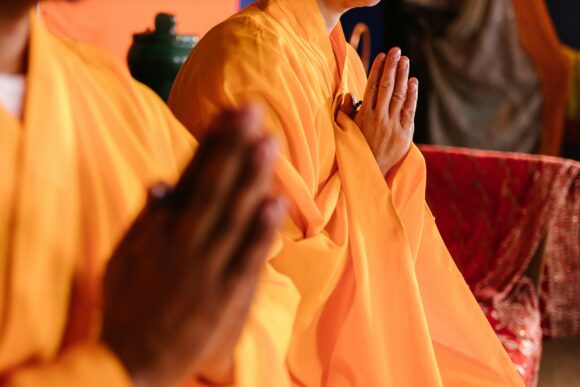Thai police have arrested a woman accused of having sexual relations with Buddhist monks and using explicit photos and videos of the encounters to extort money from them, in a scandal that has further shaken Thailand’s deeply revered Buddhist establishment.
Identified by police only as “Ms Golf,” the woman is alleged to have had sexual relations with at least nine monks and to have received roughly 385 million baht ($11.9 million; £8.8 million) from them over the past three years. Speaking at a press conference on Tuesday, police officials said a raid on her home uncovered more than 80,000 incriminating photos and videos used in the blackmail scheme.
The case adds to a growing list of controversies involving Thai monks in recent years, including allegations of sexual misconduct and drug-related crimes, which have cast a shadow over the country’s centuries-old Buddhist institutions.
Authorities began investigating the case in mid-June, after receiving a tip that an abbot in Bangkok had abruptly left the monkhood. Police say that Ms Golf had “a relationship” with the monk in May 2024 and later claimed to be pregnant with his child. She allegedly demanded over seven million baht in child support. This case triggered a broader investigation that uncovered a pattern: several monks had transferred large sums of money to Ms Golf under similar circumstances.
Police described the blackmail scheme as her “modus operandi.” Further investigation revealed that nearly all of the funds extorted from the monks had been withdrawn, and a significant portion was reportedly used for online gambling.
When police searched her residence earlier this month, they seized multiple mobile phones containing over 80,000 photos and videos, which they say were used to coerce and extort the monks. Ms Golf now faces several criminal charges, including extortion, money laundering, and receiving stolen property.
In response to the scandal, police have launched a public hotline to report “misbehaving monks.” The incident has also prompted the Sangha Supreme Council, Thailand’s highest governing body for Buddhism, to announce the formation of a special committee to review and potentially reform monastic regulations.
The Thai government is backing proposals to impose stricter penalties on monks who violate the monastic code, including jail time and fines. In a rare royal intervention, King Vajiralongkorn revoked an earlier royal command issued in June that conferred higher ecclesiastical titles on 81 monks. In a statement, the monarch cited recent misconduct as the reason for the revocation, noting that the scandals had “caused Buddhists to suffer greatly in their minds.”
With over 90% of Thailand’s population identifying as Buddhist, monks are traditionally held in high regard. Many Thai men choose to enter the monkhood temporarily in pursuit of spiritual merit and good karma. However, a series of high-profile scandals has tested public trust in the institution.
Among the most infamous cases is that of Wirapol Sukphol, a former monk who made international headlines in 2017 for his extravagant lifestyle and was later charged with multiple crimes, including sexual abuse, fraud, and money laundering. In 2022, an entire temple in Phetchabun province was left without clergy after all four of its monks were arrested during a drug raid and subsequently disrobed.
Despite longstanding criticism of the Thai Sangha’s lack of transparency and internal discipline, reform has been slow. Experts point to the rigid hierarchy of the monastic order as a major obstacle.
“It is an authoritarian system similar to the Thai bureaucracy where senior monks are like high-ranking officials and junior monks are their subordinates,” explained Suraphot Thaweesak, a religious scholar, in an interview with BBC Thai. “When they see something inappropriate, they do not dare to speak up because it is very easy to be kicked out of the temple.”
Others, however, believe the current investigations may mark a turning point for reform.
“The important thing is to reveal the truth so that the public can ease their doubts about the innocence of the Sangha,” said Prakirati Satasut, a sociology scholar at Bangkok’s Thammasat University. “It depends on whether the Supreme Sangha Council will cut off some arms and legs to save the organization.”
As public scrutiny intensifies, the future credibility of Thailand’s monastic order may hinge on whether it can clean house and implement meaningful changes.






